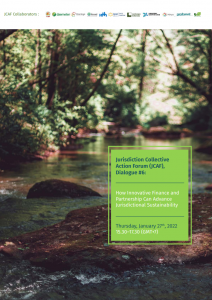EXECUTIVE SUMMARY
Co-hosted with the Inisiatif Dagang Hijau (IDH), the Sixth Jurisdiction Collective Action Forum was focused on how innovative financing and partnership can advance Jurisdictional Sustainability by leveraging existing sustainable development ecosystems. The first session established the national context that Public Funding and Public-Private financing schemes are available to leverage the transformation of jurisdictional sustainability. The Indonesian government consistently supports and pursues the country’s Low Carbon Development and has embedded it into its national planning and fiscal policies. The policy — coupled with regional and national financing of renewable energy transition, green infrastructure and taxonomy — shows a path toward sustainability and a greener economy. Therefore, leading jurisdictions can tap into such financing opportunities.
The dialogue builds on in-depth discussions on varied experiences among leading jurisdictions in developing collective partnerships and jurisdictional approaches. Some crucial components show great potentials in helping ecosystems and modalities thrive through multi-stakeholder governance and policy-framework development, integrating communities and smallholders into the supply chains, and de-risking investment through financing opportunities.
However, discussions suggested that finding an investible pipeline remained a constraint within the scope of initiative implementation. From investment perspectives, land legality and the lack of technical capacities among smallholders serve as a caveat and can only be resolved through stakeholder collaboration with Government leadership.
Led by Subnational Government, the multi-stakeholder governance in Aceh Tamiyang and Kubu Raya presented Jurisdiction modalities that focus on protection, production, and inclusive approaches. Kubu Raya mainly focuses on mangroves, forest products, and fishery commodities. Other public-private collaboration can be sewn into the government-led PPI Compact to align with the green agenda and blend them with the private sector-public fund for scaling up. Aceh Tamiyang’s experience with PUPL (Pusat Unggulan Kabupaten Lestari) shows how collaboration under the local government leadership presents opportunities for production, inclusion, and alignment protection. With the current Kubu Raya modalities and government administration, investment at the jurisdictional level becomes critical. Developing an Investment Outlook for the district is a way to accelerate Kubu Raya’s transformation toward Jurisdiction Sustainability.
In conclusion, from the national to the regional level, multi-stakeholders are in sync with the needs of innovative financing and their collaboration is vital in achieving the nationwide ambition to meet SDGs targets, as well as implement the Paris Climate Commitment.
